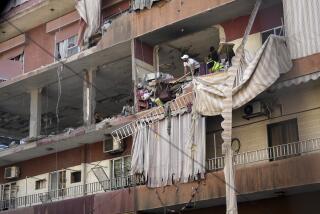Public’s High Expectations Might Lead to Hard Crash
- Share via
WASHINGTON — “It is evident that it’s going to take a while to achieve our objective,” President Bush said soberly on the White House lawn Sunday. “It’s important for the American people to realize that this war has just begun. It may seem like a long time because of all the action on TV, but in terms of the overall strategy, we’re just in the beginning phases.”
When the war against Iraq began last week, some Bush administration officials privately said it might last only two or three weeks. Early Thursday morning, they took a chance on winning the war in a single night by striking at a Baghdad compound where Iraqi President Saddam Hussein and his sons were believed to be staying.
But now -- after Iraqi forces have mounted stiff resistance in several cities, killing at least 17 Americans on Sunday and taking at least five U.S. soldiers prisoner -- the war is beginning to look as though it may last longer and cost more than some Americans expected.
And a longer war has both military and political consequences, none of them good. The military consequences are apparent: more combat, more mishaps, more dead and wounded on both sides, more casualties among civilians. But the political and diplomatic effects are equally worrisome: more doubts at home and more opposition abroad.
A long, televised siege of Baghdad with mounting civilian deaths could touch off unrest in the Muslim world and spark renewed terrorism against Americans, unwelcome consequences that a quick, “clean” war might have avoided.
“The bar that defines victory in a war like this is very high,” said Andrew J. Bacevich, a former U.S. Army officer who teaches at Boston University. “I don’t think he has six months. I don’t think he has three months. If it’s not coming to a conclusion by three weeks into the war, the skeptics’ argument becomes more credible -- and the president has a problem.”
Bush, who stopped to talk with reporters Sunday as he returned to the White House from Camp David, repeated two points several times: The war is on schedule, but it is unlikely to end quickly or easily.
“I can assure the American people we’re making good progress and I also can assure them that this is just the beginning of a tough fight,” he said.
In public, the president and his aides had never predicted the war would be short or effortless. But neither did they stress the likelihood of tough combat. Instead, during the five-month diplomatic battle to win international support for military action, they emphasized that the outcome would not be in doubt.
Some military officers warned privately before the war that public expectations were set too high, but their caution collided with the optimism of advocates of the new-style psychological warfare -- sometimes dubbed “shock and awe” -- that was supposed to buckle Hussein’s regime.
Bush worked a mild caveat into his televised statement on the first night of the war: “A campaign on the harsh terrain of a nation as large as California could be longer and more difficult than some predict,” he said.
But public expectations were already high. The war’s opening gun pushed the stock markets up and oil prices down. A Gallup Poll of Americans produced for CNN and USA Today found that two-thirds of respondents said they expected the war to last less than three months; one-third said they expected it to be over within a month; and most thought that fewer than 100 Americans would be killed or injured. Those were significantly higher levels of optimism than the same pollsters found before the 1991 Persian Gulf War.
Since that war -- in which U.S. and allied forces pushed the Iraqi army out of Kuwait after five weeks of bombing, five days of ground combat and 148 U.S. combat deaths -- Americans have come to expect their military campaigns to be short, efficient and low in casualties.
In 1999, a U.S.-led air campaign forced the Yugoslav government to withdraw its forces from Kosovo province with no allied casualties, but it took 11 weeks, long enough for then-President Clinton and his aides to come under serious criticism.
And last year, U.S. forces needed only about two months to topple the Taliban government of Afghanistan at a cost of 27 U.S. combat dead -- long enough to prompt some critics to worry that the war had become a “quagmire.” (American forces are still in the country pursuing remnants of the Al Qaeda terrorist organization.)
“We have become used to things happening quickly and objectives being achieved at low cost,” Bacevich said. “What we expect of the commander in chief today is much more than we expected from the commander in chief in World War II.”
Military officials’ descriptions of their hopes for a victory through psychological warfare, “that we could talk the other side out of fighting, inadvertently reinforced the expectation that this could be tied up neatly and quickly,” Bacevich said.
But if the war turns into a battle for Baghdad, he warned, “the level of destruction and civilian casualties could mean that we lose -- because in the debate over global leadership, it will appear to confirm the argument that Americans are not only arrogant, but brutal.”
“The big question is how many Iraqi civilian casualties there are,” agreed Michael O’Hanlon, a military expert at Brookings Institution, a nonpartisan Washington think tank. “That will determine what kind of victory this is.... The impression that some military leaders have given is that they didn’t expect this to be very hard. I’m not sure that even they are psychologically prepared for hard fighting with Republican Guard units.”
When the fighting began, public support for the war surged -- to 76% in the Gallup Poll -- in what pollsters call the “rally-round-the-flag” effect.
In the short run, pollsters said, that level of support is likely to hold up. But the support could prove fragile.
“There’s less tolerance for casualties now,” said John Mueller, an expert on war and public opinion at Ohio State University. “Before the last Gulf War, there was all that talk about the ‘mother of all battles’ and the number of body bags the U.S. military would need to buy. I don’t think I’ve heard anybody mention body bags this time. But if there are significant casualties, there will be more disillusion.”
*
Times staff writer Edwin Chen also contributed to this report.
More to Read
Get the L.A. Times Politics newsletter
Deeply reported insights into legislation, politics and policy from Sacramento, Washington and beyond. In your inbox twice per week.
You may occasionally receive promotional content from the Los Angeles Times.









